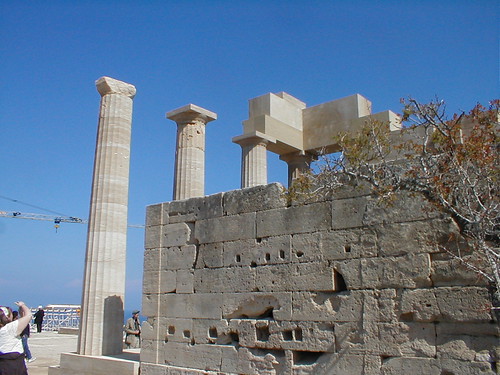Hunting History on the Island of Rhodes
No one needs to hunt history on Rhodes; history envelopes every coast, hillside, village, town and meadow on this most beautiful of Mediterranean islands. From Neolithic times, mankind has roamed these shores, from the Minoans to the Dorians to the Romans to the Venetians and Ottoman Turks, many cultures came, fought and lived here on the largest Dodecanese island. Mediterranean trade ran through Rhodes, intersecting the great sea trade lanes from the far East Orient to the burgeoning trade-hungry West, at the crossroads of Europe, Asia and Africa. The island’s strategic location lured many an adventurer, whether warlike or peaceful in intent; they all came to Rhodes and left their stamp upon the land.

Lindos Beach, Rhodes. Photo courtesy and copyright flickr creative commons: flickr.com/photos/free-stock/8425777978/
If you’re flying from England you have the choice of 3 fantastic airports; London Heathrow, London Stansted and London Gatwick. If you’re driving, all 3 airports have fantastic parking facilities. London Gatwick Parking can be found in South East London, London Heathrow is parked out west and London Stansted is up by Bishops Stortford.
If Cyprus belonged to Aphrodite, the goddess of love, Rhodes belonged to wise and powerful Athena with temples dedicated to her throughout the isle, especially at Lindos, a town of rare beauty, nestled safe under its mighty Acropolis. The towns of Rhodes, Ialyssos, and ruined Kameiros also feature temples to Athena, celebrating the goddess who protected their cities and coasts.

Temple to Athena. Photo courtesy and copyright flickr creative commons: flickr.com/photos/akuchling/122885121/
All the diverse peoples who ventured to Rhodes built towns and cities, castles and ports, temples and sacred places of worship. Travellers to Rhodes today can witness the many layers of civilisations come and gone. Earthquakes destroyed the vital town of Kameiros, which can still be seen in its ruins. Its sister cities of Lindos and Ialyssos flourish still.
These three united cities built the town of Rhodes, which became the island’s capital. From its beginnings, Rhodes blossomed, becoming one of the ancient world’s foremost cities. Strong in trade, blessed with the Mediterranean’s finest sailors, and culturally rich, Rhodes became home to philosophers and scientists, architects and writers, teachers and poets. When besieged in 305 B.C., Rhodes refused to fall. When the attempted conqueror Demetrius gave up the siege and departed, he left all his siege engines, battering rams and siege towers behind.
The crafty Rhodians then sold the collection of war equipment and with the funds built the Colossus of Rhodes, a huge statue of the sun god Helios, standing astride the harbour. In 224 B.C., an earthquake caused the statue to snap off at the knees and it tumbled onto the shore. Eight hundred years later, thrifty Arabs, having themselves conquered Rhodes, collected the pieces of the colossal statue and sold them as scrap. The trader who bought the collapsed statue required 90 camels to cart the broken pieces away. All along the caravan route, pieces of the statue were still being bought and sold years later, a sad fate for one of the seven wonders of the ancient world.
During medieval times, in 1306, the Knights of the Order of St. John Hospitaller bought the island and proceeded to construct mighty castles. The Knights ruled the land and Mediterranean sea lanes for centuries, until they too lost to Sulieman the Magnificent, who, having besieged the town of Rhodes, finally breached the town’s thick stone walls. The Knights were allowed to leave with their power and trading wealth intact. The Ottoman ruled Rhodes for centuries more, from 1522 to 1912.

Turkish Graveyard in Rhodes - remnants of the invasion by Suleiman. Photo courtesy of flickr creative commons: flickr.com/photos/dspender/4418656930/
Indeed, unless one stays completely within the newest resorts areas, one cannot avoid history when exploring Rhodes. From ancient Neolithic archaeological sites, ruined temples of Grecian gods and goddesses to Rhodes Old Town with its medieval walls and palaces, the island cannot escape its long and colourful history, its storied myths. For travellers who adore exploring ancient times and places, Rhodes is truly exemplary, an ancient wonder in the modern world.


















